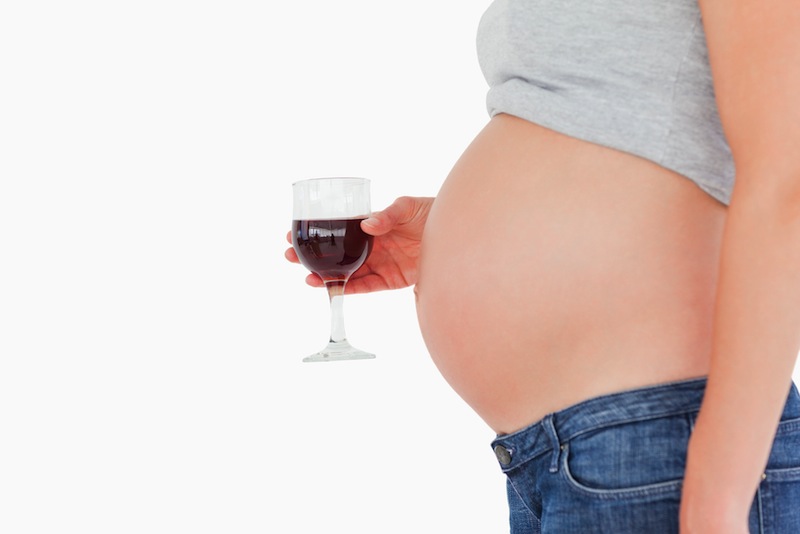Is It OK to Drink While Pregnant? Why Scientists Really Don't Know

Whether drinking small amounts of alcohol during pregnancy affects the mind of the unborn child is a topic of much current research, and now new findings suggest there are key lifestyle differences between pregnant women who sip and those who don't that most research on the topic hasn't taken into account.
Looking at data gathered on more than 63,000 pregnant women in Denmark, the study researchers found that women who said they drank a small amount of alcohol during their pregnancies tended to be healthier, in many ways, than the women who said they completely abstained from alcohol upon learning they were pregnant.
The women who drank alcohol generally were more likely to exercise and have a body mass index in the normal range compared with women who abstained. Those who drank also watched less TV, ate more fish and drank less soda, the researchers found.
"Women who drink and women who do not drink in pregnancy are very different on a large number of characteristics," said study researcher Janni Niclasen, a psychology researcher at the University of Copenhagen.
Niclasen's study did not look at why women who seem to follow other public health advice might ignore recommendations to avoid drinking during pregnancy. Such women may have the mind-set that, "I'm doing everything else right, so the occasional drink may not hurt," or that these women, who also tend to be well educated, think, "I did all right, and so will my child," Niclasen speculated.
But the findings raise important questions about studies that have suggested drinking small amounts of alcohol during pregnancy has no harmful effects on the baby. Such studies have generally taken into account factors such as women's smoking habits, income, education levels and mental health — all factors that Niclasen's study confirmed are linked with the tendency to drink alcohol. [7 Ways Alcohol Affects Your Health]
Even so, as the new study shows, many other factors not taken into account in past studies are also linked with drinking during pregnancy, and these factors may be influencing children's health, Niclasen told LiveScience.
Get the world’s most fascinating discoveries delivered straight to your inbox.
Just a glass?
No one doubts the harmful effects of drinking a lot of alcohol during pregnancy. Recent research has focused on the question of whether there is a lower threshold — a "safe" amount of alcohol that women might consume without harming their fetus.
One study of nearly 14,000 children in the United Kingdom found that pregnant women who drank less than a glass of wine per week, on average, were more likely than women who abstained to have kids with mental-health problems at age 4. The link was stronger in girls than in boys, the researchers wrote in their 2007 report in the journal Pediatrics.
In another study of 500 children, Michigan researchers found that even one drink per week for moms-to-be was linked with worse behavior in 7-year-olds.
But more recent studies have suggested that consuming low levels of alcohol while pregnant have no harmful effects on the unborn baby. In one study, researchers looked at 10,000 children in the U.K., comparing the mothers who abstained from drinking during their first trimester with those who drank less than one glass of wine weekly, on average. The researchers followed up when the children reached age 11, looking at their mental health and their standardized test scores.
"Light drinking in pregnancy does not appear to be associated with clinically important adverse effects for mental health and academic outcomes," the researchers concluded in their article, published this past February in the journal Archives of Disease in Childhood.
In another study, researchers looked at 1,600 children in Denmark, considering the ability of the 5-year-olds to pay attention. The researchers found no negative effects on children whose mothers reported drinking up to eight drinks per week.
Finding the alcohol-fetus answer
Niclasen said it would be very difficult for researchers conducting any of these studies to take into account all of the factors she identified in her research that might affect children's mental health, behavior or test scores. The associations she found between these factors and drinking may also vary across women in different countries, she noted.
She also said that psychological factors, such as a child's personality and ability to form attachments to other people, may also influence their behaviors and, therefore, make it more difficult to determine the impact of in utero exposure to alcohol, but all studies lack information on such factors.
Edward Riley, a psychology professor at San Diego State University, said the new findings did a good job of showing the tremendous number of factors that may confound studies of drinking during pregnancy. He also noted that all studies, including the new one, are based on women's reports of their own drinking, which are subject to bias and/or error.
"A lot of studies don't do a good job in controlling for all these factors, because we don't have the luxury of having the sample sizes" that it would take to statistically control all such factors, said Riley, who studies children who have been exposed to higher levels of alcohol in utero.
If researchers were to account for all the correct confounding factors, they may find that low doses of alcohol during pregnancy have an effect on children's development; currently, any harmful effect is likely overshadowed in studies of large groups by the positive effects endowed by women's other lifestyle factors, Niclasen wrote in her study.
Riley said that the generally healthier lifestyle of some women who drink lightly during pregnancy may indeed "mask an effect of low-level exposure to alcohol. However, he said, "it could also be the other way — there isn't an effect of low-level exposure." Studies that take all such factors into account are needed, he said.
Tina Chambers, an epidemiologist at the University of California, San Diego, said that the healthy lifestyle Niclasen identified as being common among women who drink during pregnancy may carry a lot of weight in hiding the measurable effect of alcohol on the brain, because alcohol's effect at low doses is likely a subtle one.
"It's easy to miss the effect of alcohol, if you have haven't taken into consideration all the myriad factors associated with alcohol and IQ," Chambers said.
Both Chambers and Riley said the differences between individual women, such as genetic or metabolic differences, likely influence the effect of alcohol on a fetus. Whereas some research has suggested that drinking does not harm babies, Chambers said, "nothing causes problems in 100 percent of exposed babies." As such, most pediatricians and related organizations recommend pregnant women avoid alcohol entirely, as there's no sure way to determine how any one child might be affected.
For any individual child, though, it is likely that exposure to alcohol does, indeed, affect the brain, Riley said. Studies of children, together with much research done in animals and cell cultures, shows that every step of brain development — the birth of new neurons, their migration to their place in the brain; their aggregation with other cells; the forming of their coating, called myelination; the development of their synapses with other neurons — are negatively affected by alcohol, he said. [11 Facts Every Parent Should Know About Their Baby's Brain]
However, scientists are still unclear how damage during neural development might translate into mental deficits in the child. The tests taken by children in such studies that are aimed at measuring children's attention spans or other cognitive skills may not be comprehensive enough to capture small differences among children, Niclasen said.
"I do think that exposure to even a little alcohol does affect the developing [central nervous system], but on a cell level — we'll never detect it with our current psychological tests," she said.
Follow Karen Rowan @karenjrowan. Follow LiveScience @livescience, Facebook &Google+. Originally published on LiveScience.

 Live Science Plus
Live Science Plus





